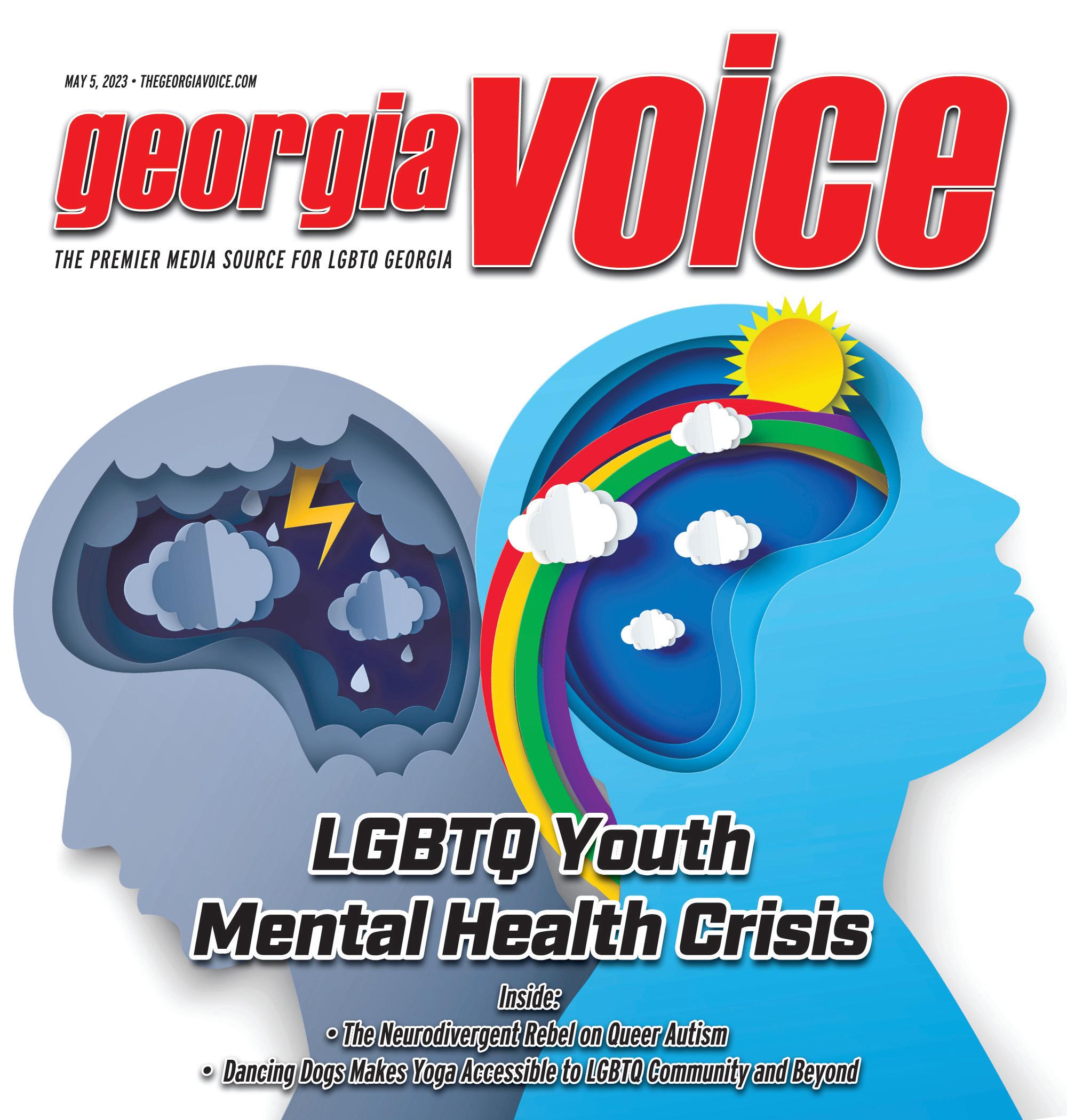
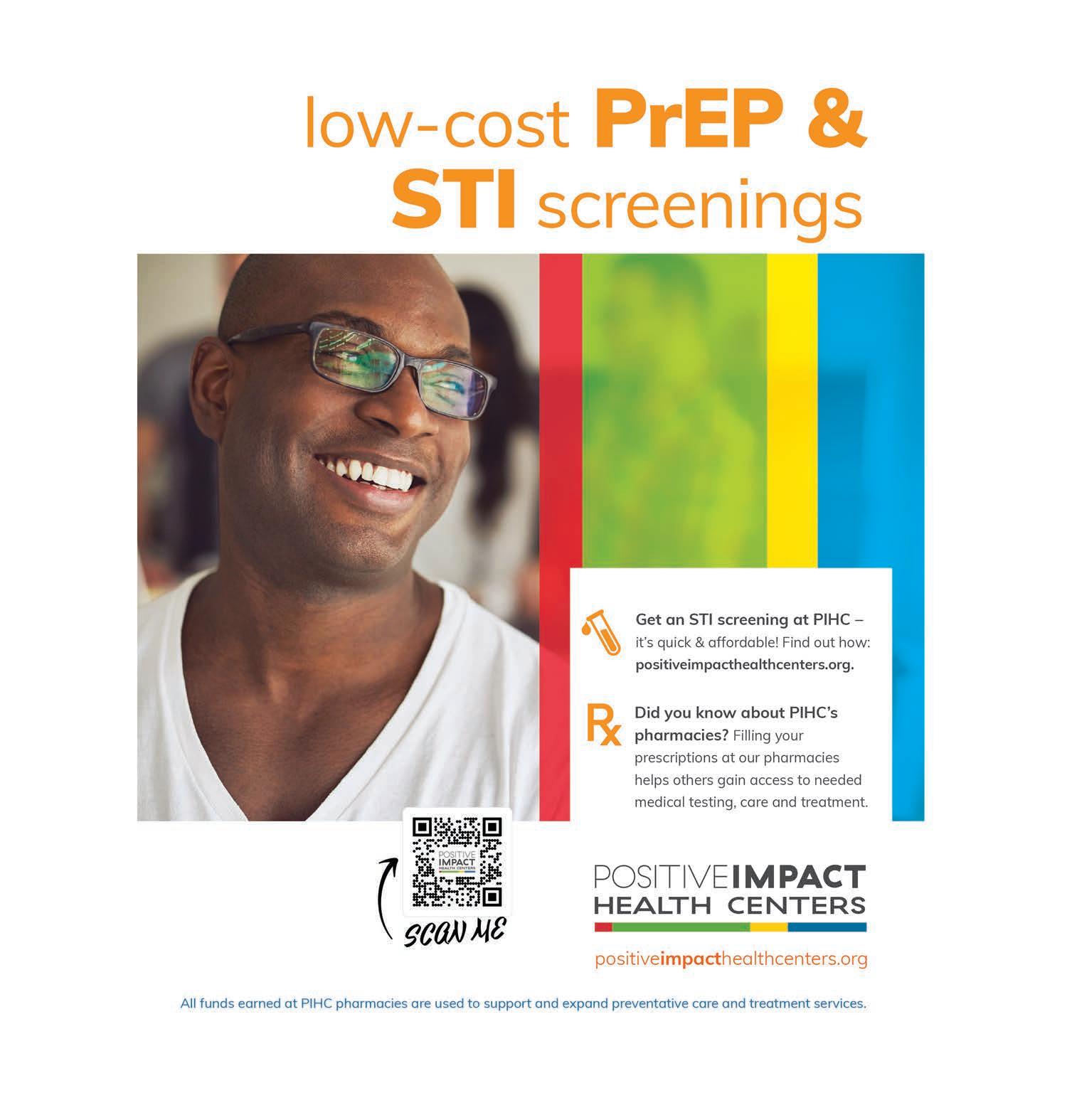
About the cover:
Cover Photo by Shutterstock.com/ Siberian Art

TheGeorgiaVoice.com
PO Box 77401 • Atlanta, GA 30357
P: 404-815-6941; F: 404-963-6365

Business
Principal/Publisher: Tim Boyd tboyd@thegavoice.com
Editorial Editor: Katie Burkholder kburkholder@thegavoice.com
Editorial Contributors:
Sukainah Abid-Kons, Rob Boeger, Melissa Carter, María Helena Dolan, Jim Farmer, Luke Gardner
Production
Art Director: Rob Boeger rboeger@thegavoice.com
Sales Sales Executive: Dixon Taylor dtaylor@thegavoice.com

Sales Executive: Jim Brams jbrams@thegavoice.com
Sales Executive & Photographer: Russell Bowen-Youngblood russ@alphabetsoupmarketing.com
Business Advisor: Lynn Pasqualetti

Financial Firm of Record: HLM Financial Group
National Advertising: Rivendell Media • 908-232-2021 sales@rivendellmedia.com
Publisher Emeritus: Chris Cash
Fine Print
All material in Georgia Voice is protected by federal copyright law and may not be reproduced without the written consent of Georgia Voice. The sexual orientation of advertisers, photographers, writers and cartoonists published herein is neither inferred nor implied. The appearance of names or pictorial representation does not necessarily indicate the sexual orientation of that person or persons. We also do not accept responsibility for claims made by advertisers.

Unsolicited editorial material is accepted by Georgia Voice, but we do not take responsibility for its return. The editors reserve the right to accept, reject, or edit any submission. Guidelines for freelance contributors are available upon request.
A single copy of Georgia Voice is available from authorized distribution points. Multiple copies are available from Georgia Voice office only. Call for rates. If you are unable to reach a convenient free distribution point, you may receive a 24-issue mailed subscription for $99 per year. Checks or credit card orders can be sent to Tim Boyd, tboyd@thegavoice.com
Postmaster: Send address changes to Georgia Voice, PO Box 77401, Atlanta, GA 30357. Georgia Voice is published twice a month by Georgia Voice, LLC. Individual subscriptions are $99 per year for 24 issues. Postage paid at Atlanta, GA, and additional mailing offices.
The editorial positions of Georgia Voice are expressed in editorials and in editor’s notes. Other opinions are those of the writers and do not necessarily represent the opinion of Georgia Voice and its staff.
To submit a letter or commentary: Letters should be fewer than 400 words and commentary, for web or print, should be fewer than 750 words. Submissions may be edited for content and length, and must include a name, address, and phone number for verification. Email submissions to editor@thegavoice.com or mail to the address above.
HEALING IS NOT LINEAR
Katie Burkholder
I started my mental health journey, as I’m sure many people did, in 2020. I’ve always struggled with self-esteem issues, and those issues manifested as depression in my adulthood. Paired with a yearslong relationship that was going nowhere and mind-numbing substance use, I finally hit a low that gave me no choice but to seek therapy.
The moment I booked my first therapy appointment was nothing short of a rebirth. It signified the first time that I felt like I was actually taking care of myself, listening to myself, and believing that I was capable of something better than I was experiencing. Therapy changed my life and allowed for a sincere self-love to inhabit my mind and heart.
I learned about inner child work. I journaled and started to read tarot. I learned about breathwork and meditation. I read Adrienne Marie Brown’s book “Pleasure Activism” and worked to heal my damaged relationship with sex and pleasure. I made genuine and sincere progress, to the point that I was able to stop therapy and maintain a more or less stable lifestyle without therapy. I felt like I had broken through, I was a changed person, and I knew exactly what to do to fight my depression and intrusive thoughts. I had let go of a decades-long held breath. I was liberated, and I was so grateful I could sob.
Until I suffered real, out-of-my-control loss, loss that pierces through you and completely changes how you see the world. I fell apart, not all at once but gradually. I had the same tools I learned in therapy, but I wasn’t employing them. I didn’t meditate, I didn’t soothe my inner child, I pushed my feelings
away, I indulged in self-loathing, I isolated myself, I allowed my self-trust to dissolve. I felt disconnected from a universe that I had finally felt held by, and from the loved ones I had finally felt understood by.
It was a terrifying feeling, because it was so familiar. I knew about this anxious, overthinking, self-doubting and distant space, this fog that clouded my mind, this hardened wall around my heart. I had felt this way for 10 years. It felt like a return to before my rebirth, like I had undone the liberation I was so grateful for.
Instead of seeing my mental health journey as a process, I saw it as complete. So, when those same depressive tendencies cropped up again, I spiraled. Not only did I feel bad, I felt bad about feeling bad. I was depressed and I was ashamed that I was depressed. I hated myself for hating myself. I knew what tools I could use to make myself feel better, and I just didn’t use them because I told myself that if I was a normal person, if I was better than I am, that I wouldn’t have to work so hard just to not be a wreck.

Unsurprisingly, this mindset made things so much worse, and what started as an inkling that being a functional and loving adult was difficult snowballed into the absolute belief that I was not good enough to handle being a functional and loving adult. There was no “best self” I should try to emulate; all of my selves were bad, and therefore putting in the work to feel better was pointless.
Of course, I was wrong. That breakthrough I experienced in 2020 was still relevant and useful to me, and I was able to snap out of it and recognize that I felt so bad because I had forgone simply taking care of myself. I talked to some friends about how I felt, I started meditating, doing yoga, and journaling again, and, lo and behold, I felt better enough to start slowly pulling myself out of the hole.
Things have changed over the last few years, but I’ve now learned that when life inevitably knocks me down, it will take work to pick myself back up. But I can do it, every single time. Sometimes it’ll take a little longer or look a little different from the last time, but I will get up. I will heal, as long as I remember, time and time again, that the solution to hurt is love.
The truth that I was unable to face, the ignorance of which pushed me deeper into a depressive spiral, is that we each have a responsibility to put in the work to be okay every single day. For those of us with depression, OCD, ADHD, PTSD, or other mental disorders, that doesn’t mean we need to be cured or free from these ailments, because we won’t be. It means that we need to learn to cope in ways that are loving, to ourselves and to the people around us. When we inevitably falter, we can pick ourselves up, give ourselves a hug, and just try again. There is no end goal of being healed. There is only right now. Pick yourself up, give yourself a hug, try again. If you can do it right now, you can do it forever.
THEGEORGIAVOICE.COM MAY 5, 2023 EDITORIAL 3
us online: facebook.com/thegavoice twitter.com/thegavoice instagram.com/thegeorgiavoice youtube.com/user/GAVoice georgiavoice VOLUME 14• ISSUE 4
Join
EDITORIAL
PHOTO BY SHUTTERSTOCK.COM / LIGHTSPRING
Staff reports
Read these stories and more online at thegavoice.com
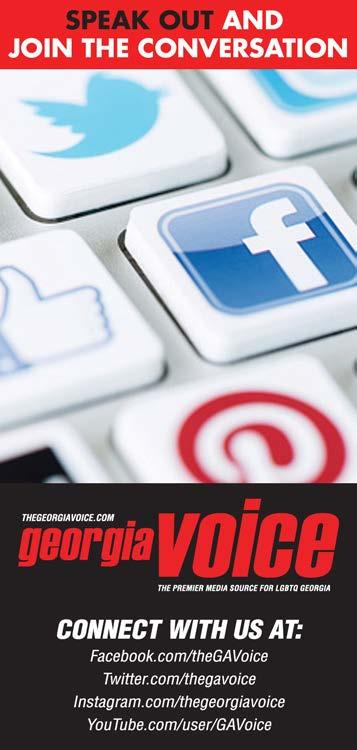

Teenager Arrested in Relation to Murder of Koko Da Doll
A 17-year-old has been arrested in the murder of transgender woman Koko Da Doll.
On April 26, Jermarcus Jernigan turned himself in after a warrant was obtained for murder, aggravated assault, and possession of a firearm during the commission of a felony, Atlanta police told NBC News. Police had released surveillance images of a man wearing a jersey approaching the entrance of an apartment building where Koko, also known as Rasheeda Williams, appeared to have left when she was shot. Jernigan confirmed he was the person in the photos but denied the shooting. He is in custody at Fulton County Jail
Koko was found on the sidewalk in downtown Atlanta earlier this month. She was well-known for her appearance in “Kokomo City,” a documentary following four Black transgender sex workers. She was murdered less than two weeks after Ashley Burton, another Black trans woman, was fatally shot in southwest Atlanta.

According to the Human Rights Campaign, at least 10 transgender people nationwide have been killed this year, including Tortuguita, a non-binary queer environmental activist who was shot by Georgia state troopers in January protesting the “Cop City” police training facility slated to be built in the Weelaunee Forest.
MTG Attacks Lesbian Teachers’ Union President, Repeats Transphobic Remarks
U.S. Rep. Marjorie Taylor Greene (RGa.) told National Federation of Teachers President Randy Weingarten she is “not a mother” during Wednesday’s hearing by the U.S. House Select Subcommittee on the Coronavirus Pandemic.
The congresswoman also repeated unsubstantiated claims that she made during a previous committee hearing with Weingarten on March 28, asserting that virtual learning
had caused an increase in the number of youth in the U.S. who identify as transgender.
Greene had sought to blame Weingarten for advising the for advising the Centers for Disease Control and Prevention on school closures. “While kids were forced to stay home, and you approved of this, the number of youths with gender dysphoria surged.”
The firebrand congresswoman’s questioning of the teachers’ union president swerved into personal territory Wednesday when she asked, “are you a mother?”
“I am a mother by marriage,” Weingarten answered. “And my wife is here with me, so I’m really glad that she’s here.”
Later, Greene said to Weingarten, “The problem is, people like you need to admit that you’re just a political activist. Not a teacher, not a doctor and not a mother.”
Two California Democrats on the committee, U.S. Reps. Robert Garcia and Raul Ruiz, spoke up in defense of Weingarten.
“The decorum of the attacks on the witness were unacceptable, that the gentlelady from Georgia just did, and so it would be nice if we didn’t attack the witnesses, particularly making a decision about whether or not she’s
a mother,” Garcia said.
Addressing Weingarten, he added, “you are a mother. Thank you for being a great parent.”
“That was not just cruel personal attacks to Ms. Weingarten who loves her children, it is reflective of the cruel personal attacks any adoptive mother or father who love their children,” Ruiz said. “So, I would kindly ask that those remarks be taken out of the record.”
During the March 28 hearing, Greene said, “Since this time, these school closures, we’ve seen a dramatic increase in trans-identifying children, which is not something that was normal nor common many years before this, and I think that’s completely devastating.”
The data suggesting an increase in the number of trans-identifying youth in the U.S. from 2017 to 2022 might instead show the new methods used to analyze the results of last year’s Youth Risk Behavior Survey, multilevel regression and poststratification, collected more accurate information.
Regardless, to the extent that the number has increased, experts say changing social attitudes about trans and nonbinary people are likely most responsible for the change by encouraging more young people to come out and live openly.
4 NEWS MAY 5, 2023 THEGEORGIAVOICE.COM
NEWS BRIEFS
Koko Da Doll COURTESY PHOTO
HIGH MUSEUM OF ART ATLANTA



The State of the Mental Health Crisis Among LGBTQ Youth
Content warning: this article includes mention of depression, suicide, and body dysmorphia.
Insomnia, depression, anxiety, and body dissatisfaction. These are just some of the symptoms of the mental health crisis that LGBTQ+youth are facing today. While researchers have seen increased levels of mental health issues among both youth and adults since 2020, LGBTQ youth are “placed at higher risk [of suicidality] because of how they are mistreated and stigmatized in society,” according to The Trevor Project.
A 2022 survey conducted by The Trevor Project across the United States examined the mental wellness and symptoms of mental illness of LGBTQ youth in all fifty states. The study examined symptoms of anxiety and depression, suicidality, access to mental health care, and factors that could help or hinder an individual’s mental health, such as the political climate of their state and if they live in supportive or discriminatory communities.

In Georgia, it was found that 72 percent of LGBTQ youth experienced symptoms of anxiety, 59 percent experienced symptoms of depression, and 46 percent considered suicide within the past year. Additionally, 14 percent of those surveyed attempted suicide within the past year.
When those who were surveyed were asked about access to mental health care, only 36 percent said that they sought and received treatment, while 64 percent reported that while they wanted to receive treatment or support of some sort, they were unable to access it. Barriers included the unaffordable nature of mental health care, a fear of
disclosing their struggles to a trusted adult, and the requirement of a parent or guardian’s permission for those under 18.
A separate report by the Trevor Project (also released in 2022) found that anywhere between 82 and 93 percent of surveyed LGBTQ+ youth experience dissatisfaction with their bodies. This can lead to disordered eating habits and eating disorders, which studies have found LGBTQ+ youth are more likely to develop. In the report, the authors from The Trevor Project noted that “LGBTQ young people often report higher rates of unhealthy weight control and eating behaviors, eating disorders and body dissatisfaction compared to their straight, cisgender peers.”
But why are LGBTQ youth so much more susceptible to struggles such as
anxiety, depression, eating disorders, and even suicidality? According to The Trevor Project’s 2022 survey on LGBTQ mental health, experiences such as discrimination, rejection by their families, and living in states with anti-LGBTQ legislation can all negatively impact a young person’s mental health. A section from the report reads that young LGBTQ people who “have experienced anti-LGBTQ victimization — including being physically threatened or harmed, discriminated against, or subjected to conversion therapy — report significantly higher rates of attempting suicide.”
In a state like Georgia, with various bills that restrict the level of gender-affirming care that transgender youth can receive, there is particular concern for how this legislation will impact the mental health of young
“In Georgia, it was found that 72 percent of LGBTQ youth experienced symptoms of anxiety, 59 percent experienced symptoms of depression, and 46 percent considered suicide within the past year. Additionally, 14 percent of those surveyed attempted suicide within the past year.”
LGBTQ+ individuals in the state.
“The Georgia General Assembly should not be inserting itself into critical decisions best left to parents and doctors by imposing a blanket ban on best-practice medical care,” Troy Stevenson, the Director of State Advocacy Campaigns at the Trevor Project, said in a press release following the passage of SB 140 in Georgia. “We urge the Georgia Senate to reject this dangerous bill and to protect access to this essential health care that has been life saving for so many.”
Research has shown that some of the best ways to support LGBTQ youth and prevent them from developing serious mental health issues include accessibility to counselors, supporting friend groups and family members, and having spaces that affirm their identities.
If you or someone you know needs support, The Trevor Project offers 24/7 access to trained crisis counselors at 1-866-4887386, via chat at TheTrevorProject.org/GetHelp, or by texting START to 678678.
6 COMMUNITY MAY 5, 2023 THEGEORGIAVOICE.COM
Sukainah Abid-Kons
COMMUNITY
IMAGE BY SHUTTERSTOCK.COM/ SIBERIAN ART
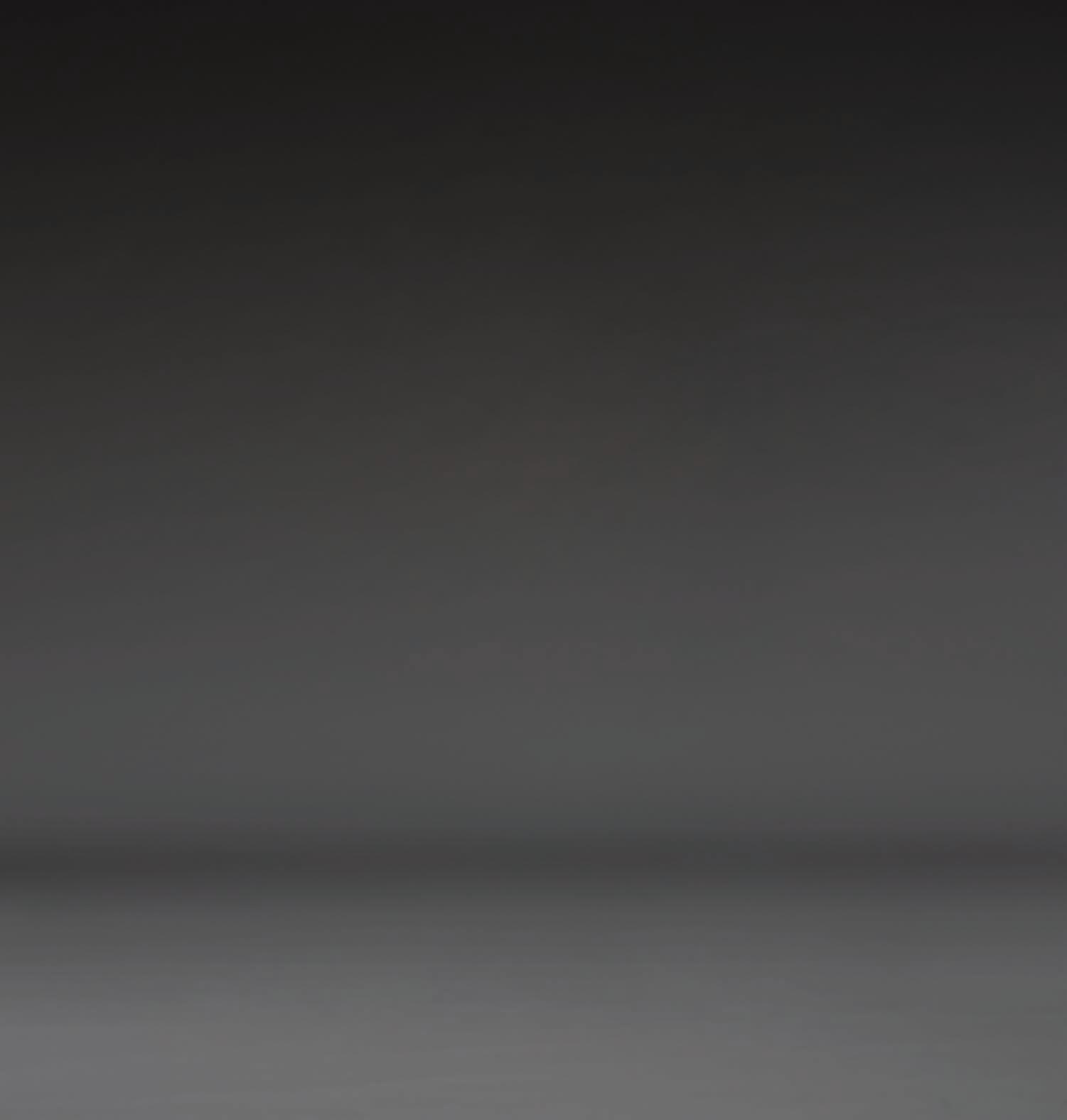















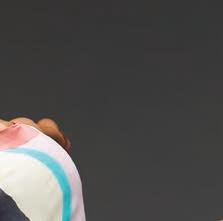





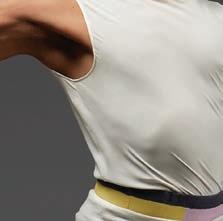
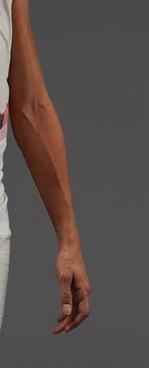




















































Art meets Love. Two world premieres and a modern classic in one program.
12–14, 2023 For tickets go to atlantaballet.com or call at 800-982-2787
Juliana Missano and Jordan Leeper. Photo by Rachel Neville.
May
Supported by
Dancing Dogs Makes Yoga Accessible to LGBTQ Community and Beyond

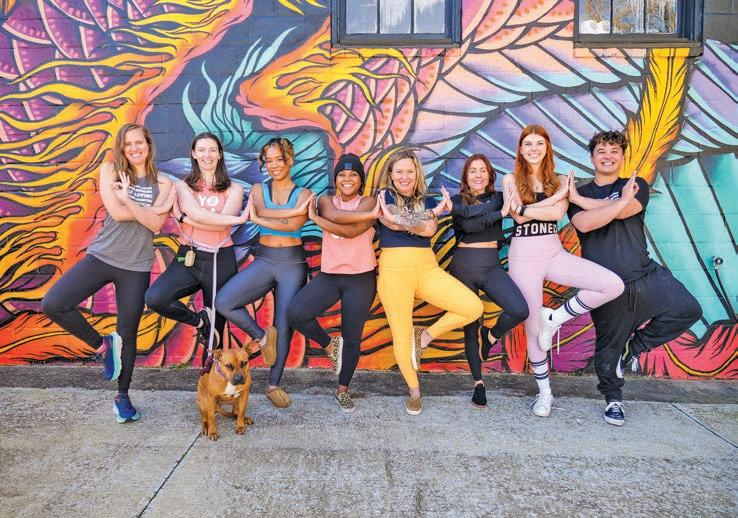
Yoga offers many benefits, both to physical and mental health, but for many, those benefits may seem available only to the white, straight-sized, middle-class women who dominate the yogic world. For those with different bodies or backgrounds, stepping into a yoga studio can be such an intimidating prospect that they opt not to at all. That’s something Jax Crowder and Dancing Dogs Yoga (DDY) are hoping to change. With trauma-aware practices, clear communication, and space that encourages everybody to be who they are, they’re making yoga accessible to all — especially the LGBTQ community.
On the first Saturday of every month at noon, DDY hosts Queer Yoga + Margs. The practice is taught by Crowder, a nonbinary energy healer, reiki practitioner, and yoga instructor.
“I’m very masculine presenting, so I often feel like I’m misgendered everywhere,” Crowder told Georgia Voice. “For me, having a space that’s designated for the queer community gives me space to be my authentic self. I know people in the queer community that are yearning for a place to belong, and there’s not a lot of yoga studios that offer queer offerings, that offer that space to explore the yogic practice without fear of being judged … Having a brave space for people to be who they are without judgment is not a place you can find very often, especially in the yoga community.”
The event offers the opportunity for both self-love and community. The yoga practice allows for reconnection with yourself and the margaritas (or nonalcoholic beverages) that follow allow for reconnection with others in
the LGBTQ community. This month’s event on May 6 will be special, with drag queens in attendance to benefit Front Runners Atlanta’s Pride Run fundraising.
The intention of queer yoga is the intention with all of DDY’s classes: to make accessible the physical, mental, and spiritual healing of yoga. Beyond the scientifically proven benefit of movement and exercise on mental health, Crowder says the practice of bringing mindfulness to both their body and spiritual energy has made a difference in their mental health.
“Your physical body manifests things that happen to you,” they said. “Being able to be mindful of your energy, of where it’s going, who you’re giving your energy to, and how much energy you’re taking on from others allows for mindfulness so you’re more attuned to what you’re doing in that specific moment — but it also allows for you to
readjust where to put your energy next … My ability to work on my own energy, to work on my own physical and energy bodies, and setting boundaries and expectations has helped my mental health. There’s still a lot of work to be done, but it definitely helps. The addition of mindfulness and presence, the connection of mind, body, and spirit, that full-body circle has helped my mental health a lot ... I have seen for myself that [yoga] allows me to deepen my practice and find more meditative states.”
Accessibility does not begin and end with the LGBTQ community at DDY. Crowder teaches their classes with what they call a “trauma aware” framework. Instead of setting a pace for the class to breathe and move at the same time, they offer a more fluid, individually paced approach. Modifications to every pose are offered in case a student can’t do or hold the original pose comfortably. Gendered names of poses
are made gender neutral to further affirm nonbinary students and hands-on assists are available, but given with strict consent: Nonverbal consent coins reading “yes” and “no” are placed on each mat. They start flipped to “no” because “consent is never assumed,” Crowder says, and they can be flipped back and forth with each pose because “consent is never permanent.”
DDY has attracted an “extremely diverse” group of students because of these accessibility practices as well as their diverse staff: many instructors are bigger bodied, BIPOC, and/or queer.
“My biggest thing is that I want somebody to show up as their true, authentic self regardless of any factors that would get in the way of that,” Crowder said. “… I’ve never found a community quite like DDY. I’ve never found a space that provides such an emphasis on showing your students that you give a shit about them.”
Georgia Voice readers can get 30 days of unlimited yoga for $30 ($19 off) with code VOICE at tinyurl.com/meetddyatl. Learn more and view their full class schedule at dancingdogsyoga.com.
8 COMMUNITY MAY 5, 2023 THEGEORGIAVOICE.COM
Katie Burkholder
COMMUNITY
The staff at Dancing Dogs Yoga COURTESY PHOTOS
Queer yoga instructor Jax Crowder

The Neurodivergent Rebel on Queer Autism
Katie Burkholder
Editor’s note: In their blog, Rivera capitalizes “Autism” and “Autistic Person/People” These style choices are reflected in this article at their request.
When Lyric Rivera learned they were Autistic, they were a fully grown adult almost in their thirties. The diagnosis completely changed their life, but when they searched for more information from other Autistic people six years ago, there was nothing. This dearth of Autistic-led and -authored information online led Rivera to start their blog, Neurodivergent Rebel. Now, Rivera has more than 250,000 followers online, all interested in learning more about what it really means to be both Autistic and queer.
Rivera spoke to Georgia Voice about their blog, the connection between neurodiversity and queerness, and how antitrans bills may impact Autistic adults in the future.

Quotes have been edited for clarity.
Just to start, can you tell me a little about you and your background?
I didn’t know I was Autistic for the first 29 years of my life. When you find out you’re Autistic and you’re almost 30, it’s a big, shocking, life-changing bombshell. For me, it really changed how I saw myself and the world and everything that had happened to me up until that point.
I always knew I was different. I felt different, even when I thought I was “supposed” to be a non-Autistic person. I didn’t have words to describe why I was different. Same with being nonbinary: I never really felt like I was a woman, but because I didn’t know about gender outside of the binary and I didn’t have the language to express that, it was like I’m going to keep this to myself because nobody’s going to understand what I’m talking about. Similar with being Autistic; I knew I was different, but those labels were ‘lazy,’ ‘not enough,’ ‘inferior.’ I had different labels
before and no way to talk about these things. Getting these labels gave me a language to explain things I’ve known my whole life.
When you say you felt different, what did that mean before you had the language to describe it?
I didn’t feel particularly different until I entered the public school system. I was around other kids, and the expectations were that I could behave and perform the way other kids did. When comparing myself to my peers, it was like I could see that other kids were doing things easily that I was struggling and trying my hardest to do. When I would be trying my hardest to do something, the teacher would be
like, ‘Oh, you just need to try a little harder, you need to apply yourself.’ As an ADHD kid, being able to sit still and quiet and be attentive in class was something I could not do until I was much older … I never got to have recess in the first grade. I wanted so badly to be good, and I couldn’t be good. I couldn’t be still and quiet. I needed more time to get that energy out, the environment was overwhelming. The punishment was taking away what I needed to regulate myself. These things at home were nonissues. Everything I needed and did at home was pretty normal. I didn’t have neurotypical expectations at home. It was the neurotypical expectations that made me feel difficult, because I tried to hold myself to those
expectations and when I couldn’t do it, I felt inferior. I felt like I wasn’t enough.
That leads to the inception several years later of Neurodivergent Rebel. I would love to talk about the blog and how it came to be. I started my blog when I was first diagnosed. It was a Twitter handle at first because I was trying to find other Autistic people. The person who diagnosed me sent me home with recommendations with reading that was put out by other Autistic people. I digested the books very quickly and I was obsessed. I went to the Internet, and I wanted more. I Googled Autism. Six and a half years ago, it was all really gloom and doom, things that were by parents of Autistic children about how hard it was or medical things about treatments. There wasn’t a lot of firsthand experiences of Autistic people. That’s why I started on Twitter.
I was trying to come out and tell people I was Autistic, and nobody could understand it. Everyone had this idea that Autistic people are Rain Man or a very specific narrow stereotype, and they couldn’t comprehend me as Autistic. I was like, people who are not Autistic really need to understand Autistic people from us. So, I created this hashtag #AskingAutistics for asking questions, which has been a driving force behind my blog and social media. We need a lot of Autistic experiences to be heard so we can take back our own stories.
When I started learning about myself as an Autistic Person, most of the organizations, charities and publications were by nonAutistic people about Autistic people. That’s why I created my blog; I wanted to become the resource I needed at that time in my life.
That leads to talking about your book, “Neurodiversity Rising.” Can you talk to me about your experiences being excluded in the workplace?
In school, one of the core traumas I’m still dealing with is being treated as the problem when I asked for help or speaking up for my
CONTINUES ON PAGE 11 10 COMMUNITY MAY 5, 2023 THEGEORGIAVOICE.COM
COMMUNITY
Lyric Rivera COURTESY PHOTO
CONTINUED FROM PAGE 10
needs. When I found out I was Autistic, I started having similar traumas being brought up where I was being treated as the problem in the workplace.
I’d done a really good job at putting myself into places that were neurodivergent friendly or I was in roles that played well into my strengths, so I didn’t need a lot of accommodation. At the workplace that inspired a lot of stories for the book, when we changed into a new office and they wanted to move things around and I said it didn’t work for me, it was like, ‘Nobody else is complaining, it’s not fair to give you special treatment, those nicer quiet window seats are for management.’ It was like, shame on you for asking to be treated differently. I was physically sick to the point that I had lost 20 pounds in six months. They knew I had been calling out of work because I was having a lot of seizures and migraines due to the fluorescent lights in the office. I just needed to change lighting, sit by a window, not sit in the busy aisle, and have noise canceling headphones. They were like, ‘We can’t do that for you.’ I immediately went and started looking for a new job.
How did these experiences lead to your book? What function does it serve?
I was working to launch a neurodiversity initiative for a consulting firm. It was going to launch in March 2020. Of course, that didn’t happen. It went on pause, and a few months later I lost my job. It pushed me to start doing the consulting thing on my own.
I can only take on a couple clients a month, so the book is the answer to the fact that I can’t and don’t want to be everywhere. The book is all of the things I’ve been teaching organizations since around 2018 put into a simple, easy to digest handbook where people can pick a section and make immediate change. Just hand it to someone who is neurodivergent or understands neurodiversity, and it costs almost nothing to make change that will make not only your neurodivergent employees’ lives better but everyone’s lives better.
I would like to shift to talk about the

intersections of autism and neurodiversity in general. There is research suggesting more Autistic people experience gender dysphoria. Dr. Wenn Lawson, an Autistic researcher, said, “The non-Autistic world is governed by social and traditional expectations, but we may not notice these or fail to see them as important. This frees us up to connect more readily with our true gender.” Does this resonate with you? How do you see autism and gender exploration connect?
As an Autistic person, in general whether it’s gender or any social construction like monogamy, none of it made any logical sense to me. You can’t give me a ‘why’ to make these rules and me having to obey to them make sense to me. When thinking about Autism as diagnostic criteria, they say we struggle with social constructs. We know statistically, on paper, that Autistic people are more likely to be trans. I wonder if we’re really more likely or that less of us are willing to go along with what society says is the box that we need to be in.
I think once it’s less stigmatized to be trans and queer in general, I know we will see
more non-Autistic and neurotypical people coming out as trans and queer, too.
For many Autistic people, truth is so important as a core value. Me saying that I’m a woman, now that I know what nonbinary is, is me lying. Now that I know I’m lying, I can’t. It feels dirty and wrong.
I think it’s so interesting that you find it hard to know why these social constructs are in place, because it doesn’t make any sense! These constructs don’t hold up to scrutiny for anybody. I think people are just coerced into abiding by them when in reality if you do ask “why,” it falls apart pretty quickly for all of us. Yeah! I’m so demand-avoidant that anything that feels compulsory feels overwhelming, feels like I’m being crushed and stifled and weighed down by it. It makes me uncomfortable when you push it on me.
That makes sense. You wrote a blog post about these antitrans bills that have been popping up and how they impact not only
trans Autistic adults but all Autistic adults. You mentioned this concept of mental health comorbidities. Can you talk to me about that a little bit?
They’re using this argument that children are too vulnerable to know their own gender identities. Autistic people are more likely to be trans. They have used this fact to draw some conclusions that we have been tricked into being trans, so now in certain states that they’re starting to adopt this Autism language. They say you have to be evaluated for being Autistic, having depression, anxiety, and other mental health conditions, and they have to be resolved before you can seek gender-affirming care. Depression and anxiety are temporary things that might be able to be resolved, but they are often side effects of gender dysphoria and the remedy to that would be to transition. For Autistic people, the recommendation is to be screened for Autism and before Autistic people can be put into any kind of transaffirming care, they have to be put into behavior modification. They’re basically going to be recommending [Applied Behavioral Analysis] over gender-affirming care, which is basically like conversion therapy for trans people.
Now, they’re saying that Autistic people are in a vulnerable class of people. What other things are they going to say that Autistic people can’t do in the future? What’s next? If we’re too vulnerable to make our own decisions, where does it stop?
That’s so indicative of how infantilizing people treat neurodiversity, especially Autism. There’s this perception that just because you have different strengths and weaknesses than the general population, that means you’re less capable. In many ways, Autistic people are more capable depending on the circumstances. They say we can’t know our own genders, but Autistic people are some of the most introspective people I know. ‘Autism’ comes from a Latin word that means self! Now it’s convenient for people, they say we can’t understand ourselves. That doesn’t make sense.
Learn more about Rivera and Neurodivergent Rebel at neurodivergentrebel.com. You can buy “Neurodiversity Rising” on Amazon.
THEGEORGIAVOICE.COM MAY 5, 2023 COMMUNITY 11
COMMUNITY
Lyric Rivera COURTESY PHOTO
My Journey of Autisic Self Discovery
Rob Boeger
Let me start out by saying that sometimes you can get the answers that you’ve been searching for most of your life. After spending more than 50 years feeling different from most people that I’ve come across—and after years of therapy—I’ve recently come to the realization that I’m autistic with ADHD.
About a decade ago, my stress and anxiety were constantly increasing when I performed everyday tasks that I could easily do in my 20s, 30s, and a portion of my 40s. I was experiencing life with an internal battery life of about 50 percent (though I never thought mine was ever capable of reaching 100 percent). Working a deadline-oriented job for more than 30 years had taken its toll, or so I thought. For years, I’ve needed an increasing amount of breaks between each work cycle—not just in the week, but in any given day of the week. In my personal life, I would constantly be telling people: NO AGENDAS and NO DEADLINES, please.
For most of my life, I’ve had an abundance of hobbies that bring me joy to counterbalance the anxiety and stresses of everyday life. Some of those are collecting comics, listening to music, photography, or watching a good scifi adventure on TV. When these dopamine fixes started to bring me less joy, I knew that something different was happening to me.
It wasn’t until I sat down with my husband to watch a comedy special on Netflix starring Hannah Gadsby (who is autistic) that I even fathomed the idea of being on the spectrum. With every word she spoke, my husband and I stared in awe at the realization that maybe I was just like her. She seemed to speak in vocal patterns similar to mine when I would “info dump” on people, which made others disconnect and pull away from me.
Feeling rejected by people who thought I was “too much” to deal with has always been silently traumatic for me.
In my youth, I developed a variety of masks to hide the parts of myself that most couldn’t handle. Imagine what that does to a person’s psyche when, no matter who you meet, it feels like they will never want to know the real you.
I thought coming out as a gay man was my most major hurdle to get through in life. I came out in 1984, at the height of the AIDS crisis, when being gay was considered worse than almost anything. I remember many members of the LGBTQ community would tell me I was an idiot for coming out and that I was inviting a lifetime of heartache and pain upon myself. At that time, there were more of those who were against us and many fewer of us who were out of the closet. I felt that I couldn’t live my life as a lie, and I wanted so deeply to live my inner truth and to be accepted by a community that I
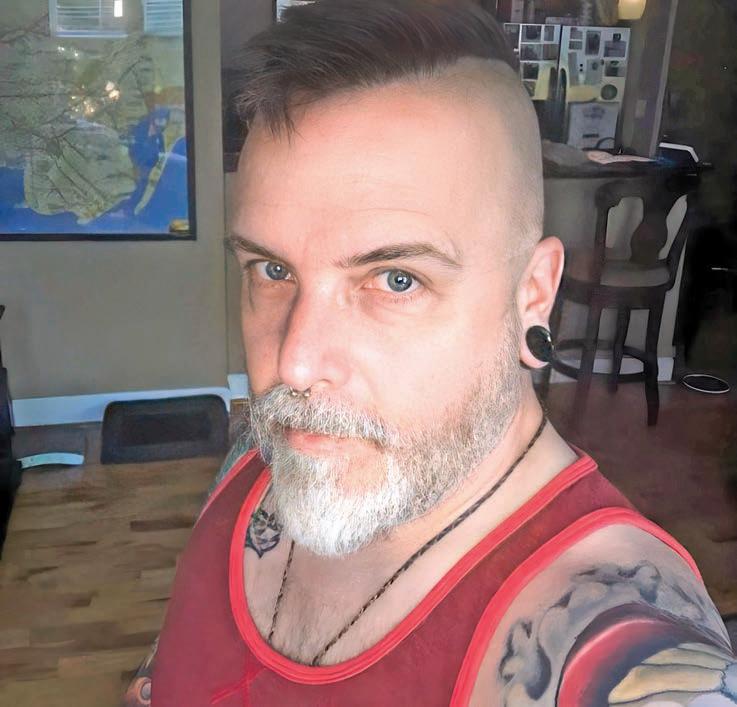
thought was just like me.
Even still, among the LGBTQ community, I felt different. Even though I felt like an outsider, I dedicated a part of my life to furthering the acceptance of LGBTQ for 30 years. During those years, I was either an activist or was working in the LGBTQ press. Over the years, not feeling seen for who I really am in this new community made me feel even more alienated than I felt before.
I was at a loss and felt that I was relegated to being the “lone wolf” with no real community that made me feel embraced; that is, until I discovered I had autism.
After seeking out a good therapist, I landed on one who specialized in autism and ADHD. With a few sessions, I felt that maybe the
answers that I had always been seeking were possibly just on the horizon once again (even though I feared that I would be rejected once more). After further research, I soon discovered a joy and fascination of life after witnessing so many autistic individuals on social media who were just like me. Many discussing handicaps that paralleled mine, ranging from time blindness, feeling mentally and physically drained most of the time, oversharing, stimming (I didn’t even know that was a word!), socialization issues, and more.
After seeing that so many parts of my personality were represented by autism/ ADHD, I began to ponder: who was the real me? This new journey of self-exploration that I am now working on is like being a child again. After a year and a half of selfdiscovery, I’ve now disposed of most of my masks except those that protect me from harm (not something one should do without the proper support network).
My only wish on this journey is that I had gotten this diagnosis decades ago, as it would have saved me from so much heartache and pain.
The next time you come across someone who is different from what you’ve experienced in your life, remember that we all are dealing with our own personal traumas and searching for our own inner truths. We all want—no, need—acceptance from each other.
12 OUTSPOKEN MAY 5, 2023 THEGEORGIAVOICE.COM
OUTSPOKEN
Rob Boeger COURTESY PHOTO
“I was at a loss and felt that I was relegated to being the ‘lone wolf’ with no real community that made me feel embraced; that is, until I discovered I had autism.”
Navigating OCD: A Personal Account
Luke Gardner
Mental illnesses are something the queer community is all too familiar with. In 2022, 73 percent of LGBTQ youth reported experiencing anxiety symptoms and 58 percent reported experiencing depression symptoms, according to the Trevor Project.
While these numbers are devastating, they are not surprising. Almost every queer person I’ve met has some form of mental illness, including me.
I was diagnosed with obsessive-compulsive disorder in 2016, and although I am still on my journey of healing, I’ve come a long way.
I was only 19 back then, and my mind was falling apart at the seams. I was still adjusting to college life in a very different environment from where I grew up, and I genuinely felt like I was losing my mind. I would have random extremely graphic and traumatizing things pop into my mind, sometimes in the form of mental pictures and sometimes as words or phrases.
I drove myself sick wondering what kind of evil, depraved human would have such thoughts, and constantly tried to reassure myself that I had a good character. I was scared that talking about what I was experiencing would make me look like a bad person, so I didn’t share it with anyone.
Eventually I realized that I could no longer live with these thoughts and decided to turn to a professional psychologist.
Walking into the first therapy appointment, I was almost certain the therapist would say I was the most unstable person they had ever seen. I was shocked when I learned that the opposite is true — that many people have similar random, scary thoughts.
One of the most validating experiences of my life was being handed a checklist of
obsessive-compulsive disorder symptoms by my therapist. It felt like I was reading a personality profile; it was exactly what I was experiencing. At that moment, I knew that I wasn’t alone, evil, or dangerous. I was just someone with OCD.
To understand OCD, you must understand intrusive thoughts.
Intrusive thoughts are generally either positive or negative and can be random or triggered by specific things. A positive intrusive thought might include a spark of artistic inspiration, while negative intrusive thoughts can include nonsensical and frightening thoughts or mental images.
We call these unwanted intrusive thoughts, and most people experience them. The difference for those of us with OCD is that these short thoughts can trigger a longer spiral of exhausting and sometimes
traumatizing ideations.
For example, a person without OCD might be walking on a bridge and think “What if I pushed someone off the bridge?” or “What if I jumped?” They might chuckle, finding the absurdity of these random intrusive thoughts funny, or perhaps give the thoughts no attention at all and just continue their day.
Unwanted intrusive thoughts are not the same as having the actual desire to harm yourself or others. These are random quick thoughts that catch us off guard and scare us, not the actual desire to jump or push someone off a bridge.
When I have these kinds of thoughts, my mind can become entirely occupied by a series of self-assurances and traumatizing images.
“Why would I think of throwing a stranger off a bridge? Am I a horrible person? No,
I know I have no desire to do that. It was just a crazy thought — wait, am I crazy? I know I’m not a bad person, because bad people wouldn’t even be bothered by that thought.”
Often, the thoughts that we are most upset by are the ones we react the strongest to. The sick irony is that by giving these thoughts energy, by reasoning with them and trying to consolidate ourselves, we enable the spiral to continue.
Of course, unwanted intrusive thoughts are not the only symptom of OCD, and everyone experiences the disorder differently.
These days I take medication for my OCD, and I’ve learned that unwanted intrusive thoughts are meaningless and should just be ignored when possible: do not feed into the spiral.
Perhaps most importantly, I’ve learned our thoughts do not define our character. Our choices do.
To find a mental health professional with experience treating OCD, visit psychologytoday.com/us/therapists.

THEGEORGIAVOICE.COM MAY 5, 2023 OUTSPOKEN 13
OUTSPOKEN
PHOTO BY SHUTTERSTOCK.COM / PATHDOC
“Intrusive thoughts are generally either positive or negative and can be random or triggered by specific things. A positive intrusive thought might include a spark of artistic inspiration, while negative intrusive thoughts can include nonsensical and frightening thoughts or mental images.”
Sylvia Beach (1887–1962) and Adrienne Monnier (1892–1955)
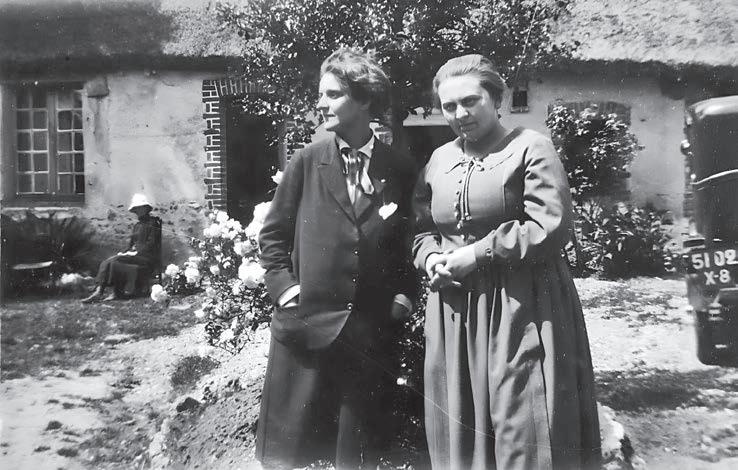 María Helena Dolan
María Helena Dolan
Read the full column online at thegavoice.com.
Sylvia Beach was the daughter of a Presbyterian minister whose wanderings from parsonage to parsonage finally established him at the Presbyterian Church of Princeton University (later, he became president of Princeton).
Sylvia was disgusted by her slapdash education and constant movement. She had a fear of replicating her mother’s miserable marriage. What to do? At the spinsterish age of 28, she proceeded to France to volunteer during World War I. All the men were at the front, so agriculture and nursing fell to women. Sylvia did both.
And Adrienne? A lifelong Parisian, she’d worked as a teacher, translator and literary secretary. She was also a woman of grand appetites: passionate intellect, ardent culturalist, gourmet cook, determined lesbian, brilliant essayist, protector of the arts. With all the abandoned storefronts and money provided from a familial transit accident, Adrienne was able to open her dream book shop in 1915 — plus the first French subscription lending library.
People needed a new bookshop, as almost all closed when the men went east. There on the Left Bank, at La Maison des Amis des Livres (House of the Friends of Books) you could browse, read books, take tea, and always discuss literature and artistic ideas.
One blustery Parisian day in 1918, Sylvia walked into Adrienne’s bookstore. She felt this was it, where she was meant to be. They became fast friends and, quickly, lovers. Sylvia moved into Adrienne’s apartment above the bookstore.
Sylvia decided that she must open an Anglophone version of the Francophone bookstore. And so, Shakespeare and Company
came alive in 1919 with some financial support from her mom and Adrienne’s assistance with advice and navigation of red tape and prejudice.
Shakespeare and Company became the home away from home for all expat or visiting American writers, artists, and whoever showed up on the shores. Expats said that Americans landing in Paris would do two things immediately: First, order an alcoholic drink, which could not be done in Prohibition-era America; then, trek to the shrine of Shakespeare and Company and maybe purchase a forbidden copy of James Joyce’s “Ulysses.”
Sylvia and Adrienne had lived together for 17 years, but Sylvia never lived with her again until forced by the war, because in 1937, Adrienne moved in with the young Gisele Freund, a stateless German Jewish socialist lesbian agitator, while Sylvia had gone to the States for health treatments (Gisele, the only survivor from her student group in Germany, eventually fled to South America).
Yet the Parisian and the American remained lifelong companions. Adrienne continued to run her beloved store. Unfortunately, Sylvia paid for living her authentic life when the Germans came to town on June 14, 1940.
All the “wrong” racial types were dismissed from positions and from schools. Parisians depopulated the city, walking away and leaving their dogs in the streets.
One day, a Nazi officer demanded the copy of “Finnegan’s Wake” displayed in the bookstore window. She refused to sell it, and he said he would return for all of her stock. Terrified, she was able to dismantle the entire shop within hours, with her remaining Parisian friends carrying basket after basket of books up to a vacant fourth floor walkup down the street. By afternoon, her store was shuttered, the sign even painted out.
Naturally, the Nazis came for her. In August 1942, along with other “alien” women, she was trucked to an abandoned zoo, then out of the city to a railway station, sealed into a cattle car and transported to Vittel, one of the ‘showcase’ concentration camps where inmates received mail and visits from the Red Cross (her Jewish friends were herded further east and never heard from again).
Adrienne, meanwhile, had been going mad in Paris, trying to find anyone, anything, to help get Sylvia out. She finally appealed to “Jacques Benoist-Mechin, who had translated excerpts of Ulysses into French ...had welcomed the
German occupation, was a collaborator, a fascist, an SS general and an ambassador in Paris for the enemy … [After a six-month internment], he secured Sylvia’s release on health grounds,” Souhami writes.
Sylvia returned to Paris and basically hid until Liberation.
After the War, Adrienne returned to her bookstore, but Sylvia did not reopen hers.
In 1954, Adrienne became afflicted with a loud, incessant ringing in her ears. Within a year, she was dead, committing suicide rather than continuing to live with the torment.

Sylvia got by on small sums from writings and offerings from friends and family. Upon her death, her papers et al. went to Princeton, as did her ashes. There is even a street called Sylvia Beach Way there.
But a Paris with no English language bookstore? The “endearing eccentric” fellow American writer George Whitman opened a bookshop in the 1950s and welcomed a new generation of writers. Now, there’s a rechristened Shakespeare and Company. Whitman’s daughter, Sylvia Beach Whitman, owns it, loves it and tries to keep the feel of the original shop. All manner of travel operators include the shop on their itineraries, even a Viking cruise into Paris. You can get a drink, then buy a copy of “Ulysses” or just browse.
14 COLUMNIST MAY 5, 2023 THEGEORGIAVOICE.COM
“Sylvia decided that she must open an Anglophone version of the Francophone bookstore. And so, Shakespeare and Company came alive in 1919 with some financial support from her mom and Adrienne’s assistance with advice and navigation of red tape and prejudice.”
REELING IN THE YEARS MARÍA HELENA DOLAN
Sylvia and Adrienne at Monnier Family Farm. HISTORICAL PHOTO



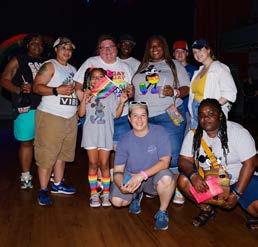

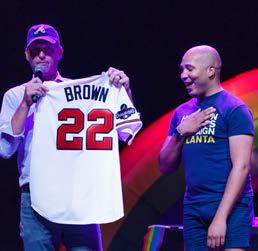
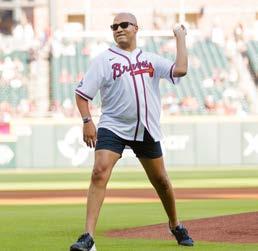

PRIDE NIGHT TICKET PACKAGE Pregame party at the Coca-Cola Roxy Game ticket Braves Pride hat $4 donation to United Way OUT Impact Fund TICKET PACKAGE INCLUDES: JUNE 15 BRAVES.COM/PRIDE TOGETHER WITH
Upcoming Voices of Note Shows Honor the Stories and Lives of LGBTQ Community
Katie Burkholder
This Pride Month, Voices of Note will be hosting two shows spanning from a fun Broadway extravaganza to a more serious look at religion and spirituality.
On June 3, the Atlanta Women’s Chorus will perform Tell Your Story. The show, which was originally supposed to be held in 2020, works much better now, AWC Artistic Director Melissa Arasi told Georgia Voice.

“We planned this show for the June concert of 2020, and that kinda didn’t happen,” she said. “It wasn’t exactly the right time to do it; we were going to do it last year, and we were exhausted … It was really great that we [stepped back] because we revamped a few things, and I think it’s a more fun time than it was a year ago for people to enjoy something like this.”
This all-Broadway show will include fan favorite songs and deep cuts, all that tell a story. It will be a fun tribute to the highenergy joy and drama of Broadway while still honoring the mission of AWC.
“This really centers on stories,” Arasi said. “We selected songs that were really specific stories that oftentimes speak to us as individuals, or the LGBTQ community. We’re singing ‘Make Them Hear You’ [from ‘Ragtime’]. That obviously talks about racism. While there’s joy and Broadway fun to it, it also has a mission-related piece where we look at the things that mean a lot to us. We can’t seem to get away from that. The AWC is really focused on the things that speak to our hearts and how we’re connected to this community we’re in.”
One of the ideals that is at the heart of AWC is inclusion.
“I have a singer who’s moving to Cincinnati … Last night, we found out it was her last rehearsal,” Arasi said. “She was crying and upset, and she said, ‘What we have here is so special. I’ve never experienced it in any group I’ve sung in. It’s a sense of community and a real support mechanism that’s not just about the music.’ We’ve created that bond by being so welcoming of anyone who can sing these vocal parts.”
“We’ve kept the name Atlanta Women’s Chorus, but we have several nonbinary members,” she added. “We say we’re singers and siblings of the AGMC instead of sisters … We still have women’s issues that we want to support and that are important to the chorus. When we do auditions, anyone that can sing the parts that can support women’s issues are welcome. That opens the door to be more inclusive.”
Tell Your Story will “run the gamut” of Broadway tunes. The first half will start with “Without a Song” from 1929’s Great Day, followed by “Sit Down You’re Rockin’ the Boat” (Guys and Dolls), “Somewhere” (West Side Story), “What I Did For Love” (A Chorus Line), “I Dreamed a Dream” (Les Miserables), and “Make Them Hear You,” and then end with “I’ll Cover You” from RENT.
The second half kicks off with a fun, choreographed rendition of “You Can’t Stop the Beat” from Hairspray, followed up by “Popular” (Wicked), “I Believe” (Spring Awakening), “She Used to Be Mine” (Waitress), “Unruly Heart” (The Prom), and “You Will Be Found” (Dear Evan Hansen). The show closes out with “Who Lives, Who Dies, Who Tells Your Story” from “Hamilton.”
“I think everyone will love this show,” Arasi said. “We’ll be staging quite a few things with some movement, and between the soloists and having a rhythm section going, it’s going to be a moving, fun concert.”
Later that month, the Atlanta Gay Men’s Chorus will perform “Returning to the Root” on June 9 and 10. For the LGBTQ community, religion has been used as a cudgel to shame, resulting in lasting pain and division from other communities. But if one moves past the way people have misused religion, the core of every major religion is trying to teach the same things — how to be good to each other in this world; how to love all people; and how to create peace. The show is a tribute to that golden rule, focusing on the concept of loving relationships between people within a sacred context.
The concept for the show stems from Rabbi Shmuel Hanagid, who was not only the most influential Jew and Talmudic scholar living in Muslim Spain in the 11th century, but also wrote a great deal of homoerotic poetry. Text from two of his love poems will be performed during the show’s second act.
Other songs include “The Golden Rule” by Wayland Rogers; “Returning to the Root” by Joshua Rist; “La Vie Boheme” and “Seasons of Love” from RENT; “The Greatest Gift” by Sufjan Stevens; “Raise You Up/Just Be” from Kinky Boots; and more.
Tell Your Story will be on June 3 at 2 and 7pm at Lassiter Concert Hall. Returning to the Root will be on June 9 at 7:30pm at Atlanta City Hall and June 10 at 7:30pm at Conant Performing Arts Center. For tickets, visit voicesofnote.org.
16 CULTURE MAY 5, 2023 THEGEORGIAVOICE.COM
CULTURE
Melissa Arasi and the Atlanta Women’s Chorus COURTESY PHOTO

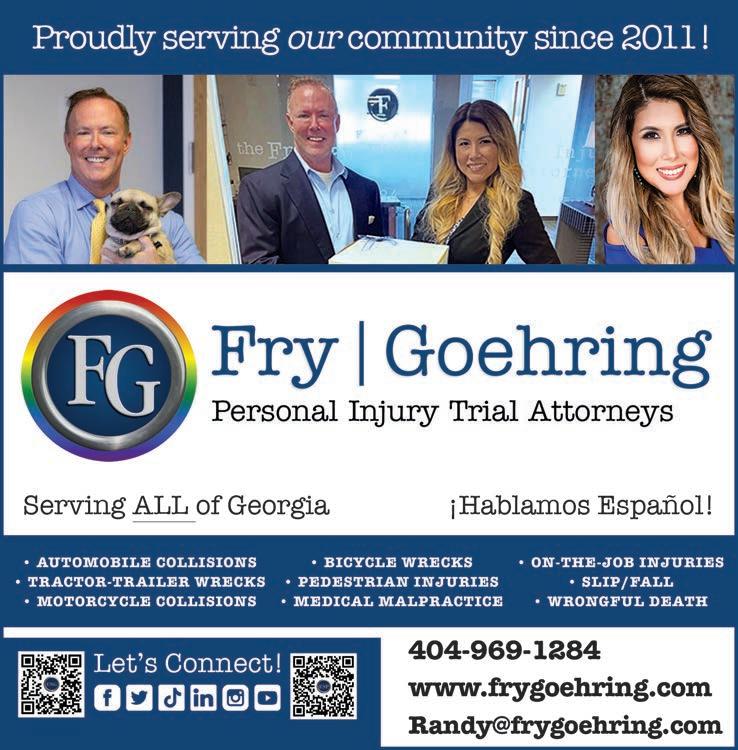

THEGEORGIAVOICE.COM MAY 5, 2023 ADS 17
‘It’s Only a Play’ and ‘Ruthless!’ Look to Generate Laughs
Jim Farmer
Two campy, gay-directed productions are on tap for local theater patrons.
Out director DeWayne Morgan is directing Process Theatre’s version of “It’s Only a Play” at Onstage Atlanta, written by legendary gay playwright Terrence McNally. It takes place on opening night of a Broadway show called “The Golden Egg.” At the producer’s house, the team is having an opening night party, and everyone gets inadvertently stuck in his bedroom as they await incoming critical notices.
“Every time they try and go downstairs, something happens,” Morgan told Georgia Voice.
In the mix is a has-been actress trying to get her career back on track, a playwright with his first Broadway show, his best friend, a TV actor, the director and a theater critic known for brutal reviews.
“It’s a behind-the-curtains glimpse into what it’s like to put on a show on Broadway and how heartbreaking and how exuberant it can be,” Morgan said. “Sometimes you succeed and sometimes you don’t. It’s very farcical. The play teaches you that theater people are very resilient and no matter what happens they still keep going on to the next project.”
The play was revised from a 1978 play called “Broadway, Broadway.” Originally it premiered off-off-Broadway in 1982 and
then off-Broadway four years later. McNally modernized it for a 2014 Broadway run. Originally the play had its cast waiting in the bedroom for a phone call. Considering that everyone has a cell phone these days, he added cell phones and changed references. There are also many jokes about Broadway stars and shows.
Two of the characters in the play are gay. To Morgan’s knowledge, this is only the second staging of the play in Atlanta. Process Theatre also staged it in 2018 at Out of Box Theatre.
According to Morgan, “It’s Only a Play” was one of McNally’s first big Broadway shows, and it has dramatic moments, but much more comedy.
“His shows can get deep, but this one doesn’t get as deep,” he said.
Out Front Theatre Company has just opened “Ruthless!” The musical — featuring music by Marvin Laird and book and lyrics by Joel Paley — follows eight-year-old Tina Denmark, who realizes that she was born to play the role of Pippi Longstocking and is willing to do anything to get the part, including murder.
It’s a musical parody that premiered in the early ’90s and a sendup of camp classics, such as “All About Eve,” “Auntie Mame,” “The Bad Seed” and “Gypsy.”
“It’s the type of entertainment that audiences want,” Paul Conroy, Out Front’s founder and producing artistic director and director

of the production, told Georgia Voice. “It’s showy and campy and not anything serious. With everything that is going on in the world, I think we need more entertainment like that.”
Three main characters are star wannabe Tina; her mother Judy, a stereotypical 1950s housewife; and Sylvia St. Croix, a mysterious woman who comes into their lives as a talent agent.

Conroy compares this to his production of “Xanadu” a few seasons back.
“I think this is like that,” he said. “I think something can be queer without having queer characters in it.”
“Ruthless! “ recalls the screwball comedies of the ’40s and ’50s. According to Conroy, the first act is like a 1950s middle-of-nowhere living room and the second act is in a penthouse apartment in New York.
Several notable LGBTQ Atlantans will make appearances in the show.
“It’s a running joke that the father is away,”
Conroy said. “At the very last moment he comes back, and we have a rotating slate of guests who will play the father.”
The new comedy/drama “Support Group for Men” is also running at Horizon Theatre. Written by Ellen Fairey and directed by Jeff Adler, the play revolves around a small group of Chicago friends who meet every Thursday to talk among themselves. There is a strict “No Ladies” policy enforced. The time period is 2017 amid discussions of #MeToo and gender issues and a new visitor shakes up the sanctity of the group. There are some surprises along the way, including an LGBTQ character.
MORE INFO
“It’s Only a Play” runs through May 14 at Onstage Atlanta
Ruthless” runs May 4–20 at Out Front Theatre Company
“Support Group for Men” runs through May 28 at Horizon Theatre
18 COLUMNIST MAY 5, 2023 THEGEORGIAVOICE.COM
The cast of Out Front Theatre Company’s “Ruthless”
JIM FARMER ACTING OUT
PHOTO BY TYLER OGBURN PHOTOGRAPHY



THEGEORGIAVOICE.COM MAY 5, 2023 ADS 19
Jim Farmer
20th Anniversary Industry Mixer
May 5, 6:30pm
Atlanta City Hall
Don’t miss Meak Productions’ 20th Anniversary Industry Mixer, hosted by Councilwoman Keisha S. Waites.
Prayer for the French Republic
May 5, 7:30, through May 14
Actor’s Express
Actor’s Express presents “Prayer for the French Republic,” written by Joshua Harmon. On the eve of the 2016 French presidential elections, a Parisian doctor fears for her family amid the rise of antisemitism in France. As she considers relocating to Israel, we flashback to her great-grandparents in 1945 anxiously awaiting the return of loved ones recently liberated from the concentration camps. This uplifting family saga introduces us to five generations yearning for the safety of home.
Manhole
May 5, 9pm
Noni’s
Manhole, Atlanta’s only all drag king show, is back tonight at Noni’s (357 Edgewood Ave. SE, Atlanta, GA 30312) for an all Latinx cast in time for Cinco de Mayo.
It’s Only a Play
May 6, 8pm, through May 14
Process Theatre
The Process Theatre presents “It’s Only a Play,” a Broadway comedy about the comedy of Broadway.
A Very ‘90s Drag Brunch
May 7, 2pm
Atlanta Comedy Theater
Hear your favorite ‘90s songs performed by our fabulous cast of ATL’s best drag queens at a Very ‘90s Drag Brunch. Come in a ‘90s lewk and sing along, with performances by Brigitte Bidet, Drew Friday, Dotte Com, Eden, Ellasaurus Rex, and JayBella Banks.
PALS Bingo
May 9, 7:30pm
Lips Atlanta
Hostesses Bubba D. Licious and Erica Lee and special guest performers will delight, amaze, and shock you as they call bingo, put on a show, and help raise money for Pets Are Loving Support (PALS). Tonight’s theme is “Big Hat Bingo —
EVENT SPOTLIGHT
Ruthless! The Musical
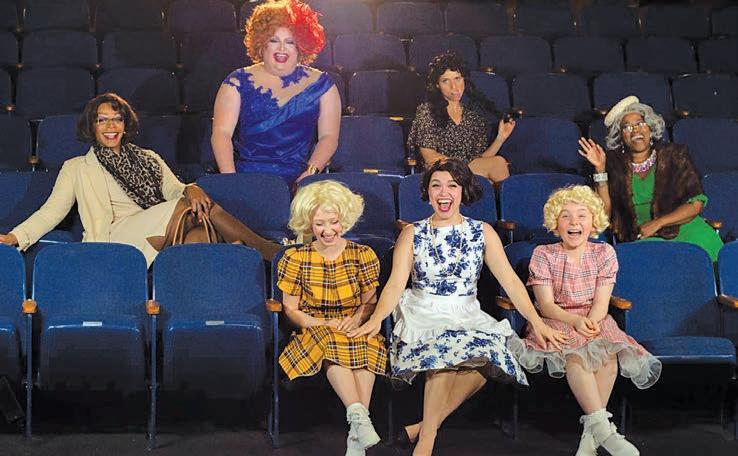
Out Front Theatre Company
May 7, 3pm, through May 20
“Ruthless! The Musical” is now running at Out Front Theatre Company. In it, eight-year-old Tina Denmark knows she was born to play Pippi Longstocking, and she will do anything to win the part in her school musical. “Anything” includes murdering the leading lady.
Tonight is Piano Night at Atlanta Eagle, with an open piano with David Reeb and an open mic.
Atlanta BeltLine Lantern Parade
May 20, 7:45pm
Adair Park 1
The Atlanta BeltLine Lantern Parade returns today. Bring your lantern to line up at Adair Park 1, at Catherine Street and Lexington, and find a spot behind one of the five marching bands. Marshals will be there to help Line up starts at 7:45pm with a little festival courtesy of Atlanta Beltline Inc., and the step-off is at 8:45pm.
PFLAG Support Group
May 21, 2:30pm
Spiritual Living Center
The PFLAG support group for parents and families of LGBTQ children meets in person today.
Grease Screening
May 25
10th Street Park
Midtown Alliance and Out On Film are happy to present a free outdoor screening of “Grease” tonight at sunset. The event will take place at 10th Street Park., 1005 Peachtree St NE. Bring your friends, bring your dog, bring a chair or blanket and enjoy free popcorn. A free bike valet will also be available at this event.
Others
Kentucky Derby Night. Significant
May 12, 8pm, through May 14
Cobb Energy Performing Arts Centre
A world première commissioned by Atlanta Ballet; “Significant Others” explores the role of artistic collaboration in the relationships of three historical power couples of the art world. Using the music of Clara and Robert Schumann, the visual art of Sonja and Robert Delaunay, and the writing of Zelda and F. Scott Fitzgerald as starting points for his own work, Remi Wörtmeyer sets out to prove that artists achieve their greatest creative potential by inspiring and supporting each other, particularly when bound together by the complicated, colorful, and powerful force we call love.
Let the Record Show: A Political History of ACT UP New York, 1987-1993
May 13, 7:30pm
Charis Books and More
Charis Books and More welcomes Sarah Schulman for a reading and discussion of “Let the Record Show: A Political History of ACT UP
New York, 1987-1993.” Twenty years in the making, Sarah Schulman’s novel is the most comprehensive political history ever assembled of ACT UP and American AIDS activism. In just six years, ACT UP, New York, a broad and unlikely coalition of activists from all races, genders, sexualities, and backgrounds, changed the world. Armed with rancor, desperation, intelligence, and creativity, it took on the AIDS crisis with an indefatigable, ingenious, and multifaceted attack on the corporations, institutions, governments, and individuals who stood in the way of AIDS treatment for all.
Trans and Friends
May 15, 7pm for youth, 8pm for adults
Charis Books and More
Trans and Friends is a youth-focused group for trans people, people questioning their own gender and aspiring allies, providing a facilitated space to discuss gender, relevant resources and activism around social issues, 7 – 8pm for youth and 8 – 9pm for adults, Charis Books and More
Piano Night
May 16, 7pm Atlanta Eagle
LGBTQ Book Club
May 27, 10am
Virtual
The LGBTQ Book Club, sponsored by Charis Books and More, is a group for LGBTQ+ folks and allies to read queer-themed books and books by queer authors. The goal is to have diverse thoughtprovoking discussions about queer identity, history and topical issues. All are welcome to join. This month’s book is “You Exist Too Much: A Novel” by Zaina Arafat. RSVP in advance for this meeting - https://us02web.zoom.us/meeting/register/ tZYkf-GvrjwiGNbfxB7qDE7piSIZf5mqvt4_.
All-1-Family Support Groups
May 27, 3pm
1530 Dekalb Ave NE
Atlanta Pride sponsors two All-1-Family support groups - All-1 Umbrella: This biweekly group is for transgender, cisgender, inter-sexed, non-binary and gender non-conforming youth ages 13-17 of all sexual identity. All-1 Connection: Biweekly group host by A master’s level clinician will facilitate a therapeutic support group for biological parents; adopted parents; foster parents and any adult that would like to support the LGBTQ+ youth.
20 BEST BETS CALENDAR MAY 5, 2023 THEGEORGIAVOICE.COM
BEST BETS THE BEST LGBTQ EVENTS HAPPENING IN MAY
(Photo via Facebook)
LGBTQ NIGHTLIFE FORECAST MAY 5-19
Katie Burkholder
Cholo // Cinco
May 5, 10pm
The Basement / Southern Feed Store
Celebrate Cinco de Mayo the correct way by decolonizing the tradition. Celebrate La Batalla de Puebla with dancing to music by DJ Desde Guatemala, vendors, performances, tacos, and drinks. Tickets at basementatl.com.
Charlotte de Witte –North American Tour
May 6, 11pm
District Atlanta
Tickets at bit.ly/CHARLOTTEATL2023.
Beer and Margarita Bust for the Kid
May 7, 3pm
The Hideaway
It’s a Cinco weekend fundraiser to benefit For the Kid in All of Us! With DJ Devon Rex.
Super Smash Bros
Ultimate Tournament
May 7, 7pm
Joystick
Every Sunday, Joystick hosts a knockout Smash tournament! Sign up starts at 6:30pm!
Cartridge ATL
May 10, 8pm
Joystick
Black-owned gamer lounge Cartridge
ATL takes over Joystick every Wednesday with live DJs, food, gaming tournaments, and karaoke!
Maryoke
May 10, 9pm
Mary’s
Open Mic Comedy
May 11, 8pm
Joystick
Spend Thursday nights laughing at the best local comedians in town! Hosted by Travis Allen.
Country Night
May 11, 9pm
The Heretic
Enjoy LGBTQ-friendly country two-step, line dancing, and more! Don’t know how? Come early for the free dance lesson at 8pm!
Queer Bait
May 12
Mary’s Gay pop videos with DJ Headmaster!
Earth Magic Tour with Dreamer’s Delight and Blookah
May 12, 11pm
District Atlanta Tickets at bit.ly/INZOATL2023.
Super Smash Bros
Ultimate Tournament
May 14, 7pm
Joystick
Every Sunday, Joystick hosts a knockout Smash tournament! Sign up starts at 6:30pm!
Fish and Chipz: Baga Chipz
May 16, 8pm
Future Atlanta
Hosted by Destiny Brooks and Phoenix with the casts of Fantasy Girls and Disco Dollz. Meet and greet with Baga Chipz starts at 8pm, show at 9pm. Tickets at future-atlanta.com.
Cartridge ATL
May 17, 8pm
Joystick
Black-owned gamer lounge Cartridge
ATL takes over Joystick every Wednesday with live DJs, food, gaming tournaments, and karaoke!
Maryoke
May 17, 9pm
Mary’s
Warp Zone Pup Night
May 17, 10pm
EVENT SPOTLIGHT
Fish and Chipz: Baga Chipz
Future Atlanta
May 16, 8pm
Hosted by Destiny Brooks and Phoenix with the casts of Fantasy Girls and Disco Dollz. Meet and greet with Baga Chipz starts at 8pm, show at 9pm. Tickets at future-atlanta.com. (Photo via Facebook)
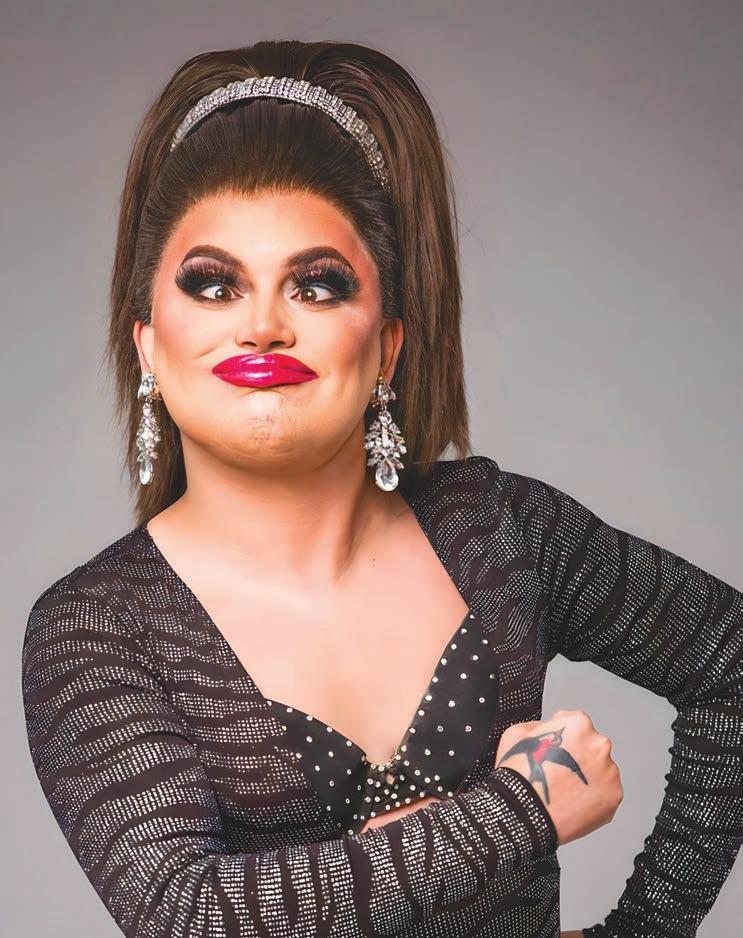
Heretic
Every first and third Wednesday, the Heretic is the pup’s favorite play pen! With DJ Tracy Levine. No cover.
Open Mic Comedy
May 18, 8pm
Joystick
Spend Thursday nights laughing at the best local comedians in town! Hosted by Travis Allen.
Country Night
May 18, 9pm
The Heretic
Enjoy LGBTQ-friendly country two-step, line dancing, and more! Don’t know how? Come early for the free dance lesson at 8pm!
Queer Bait
May 19
Mary’s Gay pop videos with DJ Headmaster!
THEGEORGIAVOICE.COM MAY 5, 2023 LGBTQ NIGHTLIFE FORECAST 21
Lawn Darts
 Carter
Carter
I recently had “the talk” with my 8-yearold son, but it’s not the type of talk you’re probably thinking of:

If you find yourself in a situation in which a gunman has entered the building, use your energy to comfort those around you. When you do, it will take your mind off your own panic.
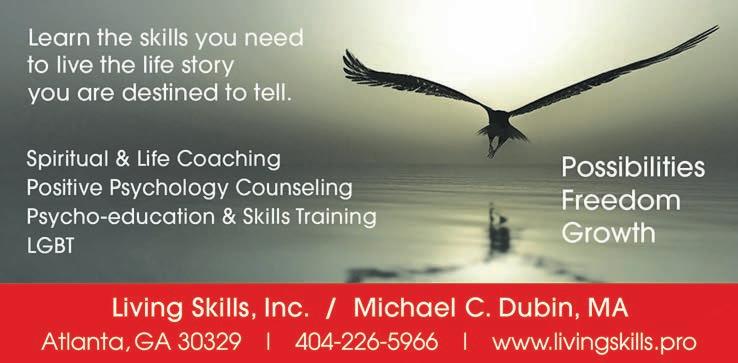
I want you to know your mother and I are right outside, there to help get you out of there. So, no need to feel like you miss us, we are right there. You just can’t see us, okay?
And if the worst should happen, that it’s your turn to go to Heaven, then know you have a whole group of family members there ready to help you.
So, you see, there is a group of us here ready to hug you when you get out, and a group in Heaven ready to hug you when you get out, so either way you are taken care of and not alone. So don’t worry, just help those around you feel better and it will be okay.
This was the conversation I had with Mr. Carter after the school shooting in Nashville. Katie Jo had similar words of wisdom for him, and when we spoke on the phone soon after this parental prepping, she simply listened as I cried and screamed in rage. This is not okay, yet there are similar conversations between parents and guardians and their school-age loved ones across the country taking place as you read this. Worse,

there are many whose kids are no longer here to have the talk at all.

This isn’t going to be a monologue about gun control. In fact, I’m going to relate this to one of the biggest threats in my childhood, which caused death and serious injury to many young children back in the day: lawn darts. For those not familiar with these weapons of grass destruction, the idea is somewhat similar to cornhole. You set up a space in your yard where you placed two rings at either end and threw metal-tipped foot-long darts in the air to try to hit the target. What could go wrong?
We had a set. I remember being a little intimidated and not allowed to touch one unless supervised by my older siblings or parents. Of course, no one had to bring up my dead relatives to try to comfort me about them, but I instinctively understood the danger of such missiles.
By then the FDA had already placed restrictions on who could sell a set, and you couldn’t find them in toy stores. There were calls for an all-out ban, but that wouldn’t happen until after a seven-year-old girl in California took a lawn dart to the head in 1987, killing her. Until that moment, 6,100 Americans went to emergency rooms for injuries, most of them 15 and younger.
More than 6,000 children were killed or injured in the United States by gunfire just in 2022. Three children’s deaths total, and lawn darts were banned. Seems the National Lawn Dart Association didn’t have much clout with politicians.
22 COLUMNIST MAY 5, 2023 THEGEORGIAVOICE.COM
HISTORIC PHOTO
Melissa
THAT’S WHAT SHE SAID MELISSA CARTER


THEGEORGIAVOICE.COM MAY 5, 2023 ADS 23













































































 María Helena Dolan
María Helena Dolan




















 Carter
Carter







